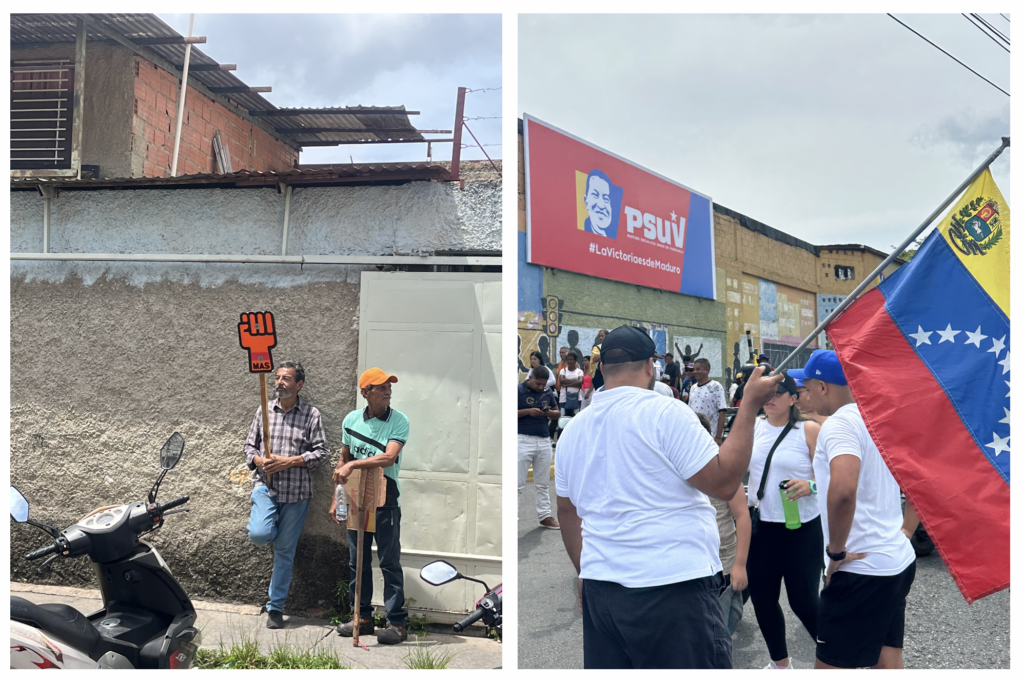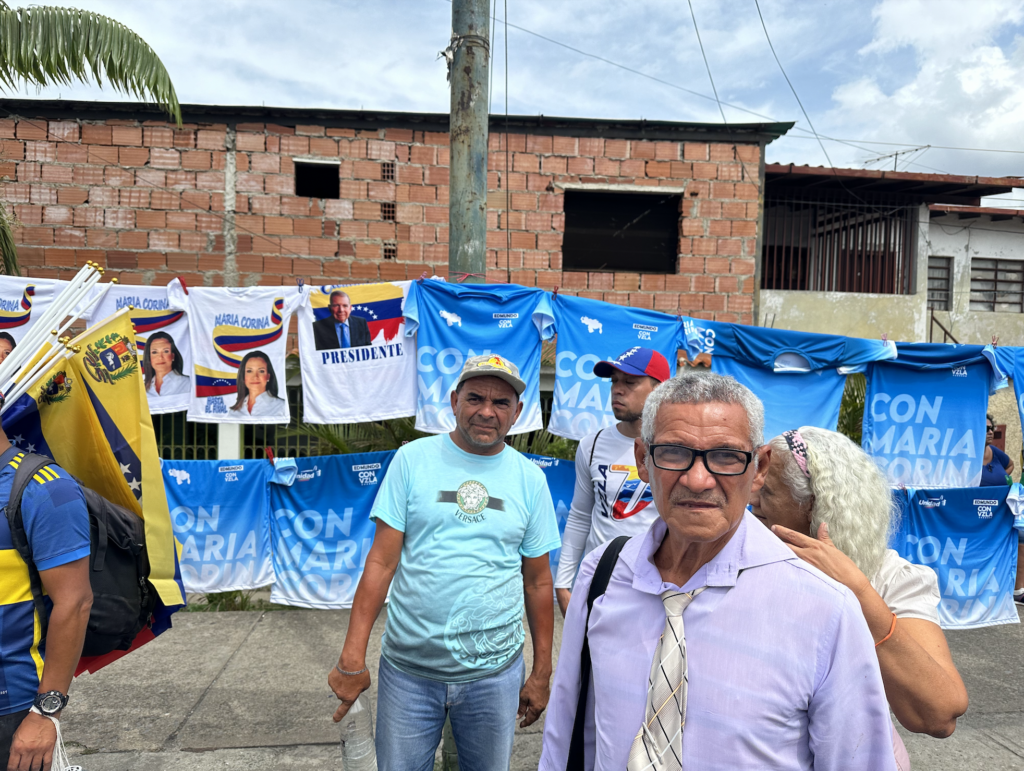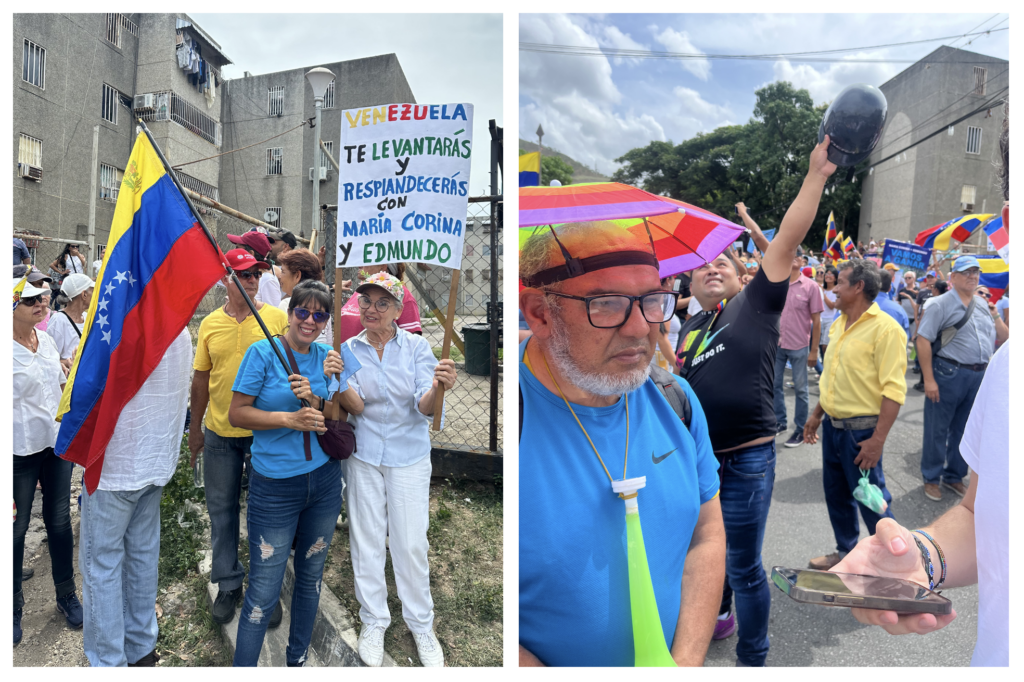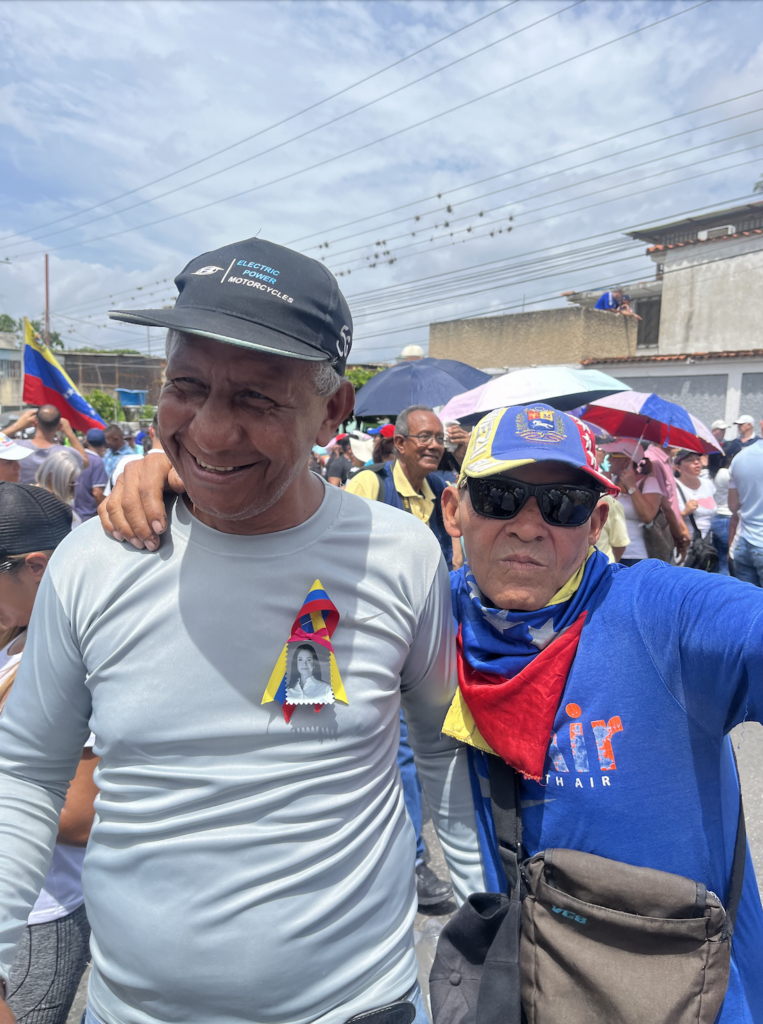Watching González Urrutia's First Rally from the Top of a Tree
A new mass event, this time including presidential candidate Edmundo González Urrutia, brings the María Corina phenomenon closer to the capital in a former Chavista stronghold


Upon arriving in La Victoria, an Araguan city with a little more than 170,000 inhabitants, I thought for a moment that Edmundo González Urrutia’s first campaign event, which was to begin in a few hours, wasn’t going to happen. As it’s become customary throughout Maria Corina Machado’s campaign tour, the government party PSUV had organized a countermarch in the area and had already mobilized buses full of supporters and public employees from different states. Both the state of Aragua and city of La Victoria are ruled by the PSUV.
I could see dozens of PSUV supporters gathered on every corner—wearing red t-shirts or caps with the colorful maps of the Esequibo campaign—coordinated by party members with walkie-talkies. They were not spontaneous concentrations. On one small street alone, I counted more than 30 buses. On another street, an avalanche of motorcycle taxi drivers blocked traffic for a few minutes, followed by a group of municipal employees from the municipal cleaning institute—wearing flag-colored shirts with the name of Chavista mayor Juan Sánchez—in red rickshaws. The government even closed a local hotel to prevent the candidates from staying there, and—I later learned—Machado had secretly arrived in Aragua the previous night to avoid being stopped in some checkpoint in the morning preventing her from arriving at the march. Moreover, the town’s gasoline supply had been cut for several days.
After wandering around through the corroded streets of La Victoria, between small bodegas and hardware stores and a ruined Volkswagen dealership, I decided to have a coffee at a bakery called La Mansión de Michel. Although they sell guayoyo and pasta seca, a bit of Caracas’ bodegonic kitsch contaminated a wall decorated with artificial grass and an electric neon sign that read “happiness is made to be shared.” Also inside, Omar Barboza—secretary of the Unitary Platform—enjoyed a coffee with Hiram Gaviria, from the PUENTE party. If he’s here, I thought, the march hasn’t started yet.
Unlike Caracas, political life can still be witnessed in La Victoria. There is a Machado commando, with printed photos of her, in one of the houses; there are PPT walls supporting Maduro and his posters on light poles; there are even eroded murals that announce that with Henrique Capriles “Hay un camino.” Thus, upon arriving at the opposition march, I found a crowd waving flags of Primero Justicia (PJ) and Venezuela in front of a huge new billboard with Chávez and the PSUV logo in the colors of the flag.

The opposition rally attracted many people, as I discovered upon arriving at its origin point: a long, narrow avenue between brick houses and tin roofs. All opposition parties represented. There were flags of Encuentro Ciudadano, Un Nuevo Tiempo (UNT), Convergencia, PJ, Voluntad Popular and Vente, of course; folks wearing Acción Democrática and Movimiento por Venezuela (MPV) caps; and, in a corner, a couple of older men were holding banners with the Movimiento Al Socialismo (MAS) logo. At one point, surrounded by a frenzy of PJ members, Juan Pablo Guanipa arrived and crossed the crowd until he reached the stage.
A street vendor was selling Venezuelan flags. He also had one from UNT. A friend, curious, jokingly asked him how much for the party flag. “I don’t know, they gave it to me,” the man said, “but I’ll sell it to you for $5.” There were several stalls along the avenue selling bands with the flag, t-shirts with the face of González Urrutia, María Corina or the slogan “hasta el final” (until the end) against a turquoise background.

The event was not only good business for souvenir sellers, the bodegas around the avenue had queues of people trying to buy a Solera or Polarcita, to take a break from the Araguan sun with a beer. After a while, with no sign of Machado, we went into one of the bodegas for a cold one as well. It wasn’t even noon and techno music was blasting from speakers affixed between the bananas and the toilet paper.
In the background, the crowd alternated from the classic “¡Y va a caer! ¡Y va a caer! ¡Este gobierno va a caer!” chant and the AI made salsa that claims that everyone is with Edmundo. As I spoke to the marchers, I noticed a significant number of professors and teachers. “I have been earning 650 bolivars ($18) a month for three years,” says Rafael Segovia, a professor at the Universidad Bicentenaria de Aragua and the Universidad Simón Bolívar (USB) in Caracas. However, Segovia has not gone to USB for three years due to the lack of resources to do so: he teaches classes via Zoom despite internet and electrical failures. He says that he has barely managed to survive on bonuses and that he comes to the march motivated by the promise of a better “quality of life” for older people. “We live on a pyrrhic, miserable salary,” says Francys González, a retired teacher from a local technical school and currently a teacher at a private school.

Maibet, an educator from Villa de Cura and member of MPV, told me that she teaches at a public school and despite having the highest rank and a postgraduate degree, she barely earns $20 a month. “I don’t have insurance” and social security doesn’t work, she explained. “We lose power twice a day,” she says, “four hours each time.”
“I want my son to stay in Venezuela,” Maibet tells me, since her son is about to graduate. “Almost my entire family is abroad,” explains González. Gabriela Benítez, a 21-year-old psychology student, tells me she is thinking about leaving the country if Maduro wins in July. “Naguará, they have affected me a lot,” she says, “in everything; work, studies.” Segovia awaits the return of his family: “I’m going to be alone,” he says, “my nephews are all in Peru and Spain.” Argenis Hidalgo, a refining process technician, tells me that he also hopes his son returns from Ecuador. He wears a red PDVSA cap: he worked there, at INTEVEP, until his retirement in 2016. “I have nothing to do with politics, I identify myself with my work and with Venezuela,” he says, “but María Corina has risen to the challenge and has the balls to confront the government.” One of Machado’s main talking points is the reunion of the Venezuelan family.
But the atmosphere is festive. An elderly lady with a flowered cap, in her seventies, dances nonstop: she does not lower her arms, carrying a sign that in colored letters states “Venezuela you will rise and shine with María Corina and Edmundo.”
Then, preceded by a caravan of motorized vehicles that lead the way through the crowd of the long avenue, María Corina Machado arrives. The crowd goes crazy and quickly engulfs her. Machado runs, smiles, takes photos, and hugs people. She rides the human tidal wave until she arrives at the stage.
Machado had a cast of opposition leaders by her side: Delsa Solórzano, Freddy Superlano, María Beatriz Martínez, Andrés Velásquez, César Pérez Vivas. She encourages the crowd by reminding them of the triumph of the primaries against all odds and the permanence on the electoral route despite all the obstacles. “Libertad! LIbertad! Libertad!” the crowd responded.
Machado’s campaign is a case study for political sciences: she is a no-candidate vetoed by television channels and radio stations, that has relied on social media as its main communication channel, talking to crowds who have been suffering the whips and scorns of hunger salaries and a humanitarian crisis; with a slogan, “hasta el final,” that emerged organically in a march in Táchira during the primary campaign—in a rally with little sound equipment and trucks instead of platforms, built on personal donations, the organization of neighbors and parties and any scaffolding or device that they can find.
Since I couldn’t reach the press “stage,” a truck with dozens of journalists and cameramen, I dove into the crowd, making my way by squishing in between sweaty walls of people, asking for permission, sneaking into the few holes opening up, until I reached a residential building and begged a man to open the gate for me. From his garden I climbed a saman tree and perched on one of the branches. There, in a tree with three or four other people among the leaves and yellow ants, I observed with a bird’s perspective a pulsating sea of people and flags. “This fight has a destiny,” shouted Machado with her tricolor rosaries from the stage, “it is freedom… because we are going to la victoria.”
The crowd was spellbound. Then Machado introduced Edmundo González Urrutia, who appeared wearing a Tigres de Aragua cap and waving at the crowd. He was accompanied by his wife, his daughter (wearing a Museo de los Niños cap) and his sister-in-law. The symbol of family, once again.
Unlike Machado and her energetic, seismic speeches, González appeared sober and read his speech from a piece of paper. But the crowd, like at no other time, became euphoric when González Urrutia asked them to imagine a different Venezuela: in which “the president does not insult; a country where, when you turn on the switch, there is light and when you open the tap, there is water; where healthcare is not sick and where education educates.” The crowd screamed. “A country without political prisoners,” the crowd went wild again: “¡Hasta el final! ¡Hasta el final! ¡Hasta el final!”.
At the end of the speech, a woman in her sixties—dressed in Venezuelan flag paraphernalia—asked me for help to get off the saman tree. “I’m going to be a polling station member,” she told me, “Now I want a smoke.”
Shortly before climbing the saman, I spoke with Arelis: an elderly woman who identified herself as a “penniless dentist.” She is a pensioner and earns 130 bolivars a month ($3,6 dollars). “We don’t have water, we don’t have electricity, we don’t have food,” she said, “we want our children to return.” She was wearing a cap with the logo of the Esequibo referendum. She’s not sure where she got it from. It doesn’t matter. People are here for something else: “Change,” Rafael Segovia, the university professor, tells me. “The change,” Francys González, the private school teacher, tells me. “The change,” Erikson Pacheco, a motorizado from a bodega, tells me.
He voted for Maduro in the past, Pacheco tells me, and he didn’t like Machado. “Now I like her… a lot!” In fact, between smiles, he tells me that he had never been to a march in his life. “We are going to build the new country,” says Francys González, “Rebuild the educational part, everyone collaborating so that this country changes.”

Shortly before Machado arrived, a crowd of motorcyclists with Vente flags or t-shirts alluding to the opposition, passed honking and celebrating in front of the bodegas where people drank beer under the sun. “This is apotheosis, mano,” says Gustavo Rivero, who has a “little advertising workshop” in the industrial zone of La Victoria and has been a member of Acción Democrática since 1983, “I have goosebumps.” He has a photo of María Corina with a ribbon of the flag on his shirt. “This is unprecedented,” he says, “this is synonymous to the arrival of change; that change is coming.”
Caracas Chronicles is 100% reader-supported.
We’ve been able to hang on for 22 years in one of the craziest media landscapes in the world. We’ve seen different media outlets in Venezuela (and abroad) closing shop, something we’re looking to avoid at all costs. Your collaboration goes a long way in helping us weather the storm.
Donate




